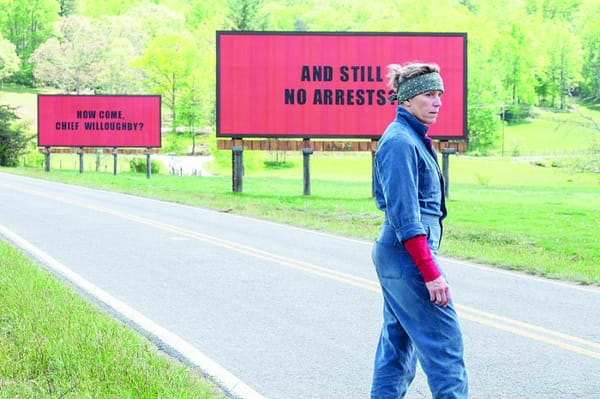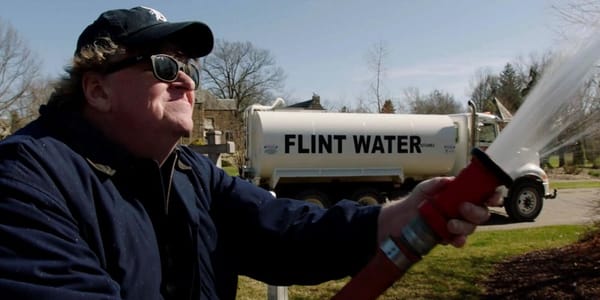A messy, ham-fisted take on race and violence
Three Billboards Outside Ebbing, Missouri heads into the Oscars race as a front-runner, but Martin McDonagh’s third feature tries to take on the heavy-hitting topic of police brutality, and falls flat.

Three Billboards Outside Ebbing, Missouri, shows what writer and director Martin McDonagh does best: write sharp, expletive-filled dialogue that snaps across the screen like it was created by Aaron Sorkin’s angry kid brother. Over the course of two previous features, and numerous stage works, McDonagh has set himself apart as one of the most unique directors working today. Unfortunately, Three Billboards also highlights his weaknesses, displaying an anathema for well-rounded characterisation, an inability to achieve tonal balance, and a complete avoidance of nuance.
Set in the small town of Ebbing – a non-specific location that serves as a stand-in for any number of generic ‘Midwestern’ locales – Three Billboards is set seven months after the vicious rape and murder of teenager Angela Hayes. It is a crime that remains unsolved, leading Angela’s mother, Mildred (Frances McDormand), to purchase three billboards along the road where her daughter was killed, reminding the townspeople that justice has not been served. “It seems like the local police department is too busy goin’ round torturing black folks to be bothered doing anything about solving actual crime”, as Mildred put it, referring to the racial tensions that lie at the heart of the film.
This decision of McDonagh’s – to wrap his snappy language around the incredibly emotive issue of police brutality – is the film’s ultimate downfall. He thrusts issues of race into the narrative with a complete lack of nuance or tact, embodying them in the character of Office Dixon (Sam Rockwell); while he might not be the only racist member of Ebbing’s police department, he is the most racist, bearing responsibility for the aforementioned torturing of people of color. Throughout the film he continually intimidates the few minority characters present, and uses disproportionate levels of force without any serious repercussions.
His ‘lovable hick’ character is, supposedly, countered by Bill Willoughby (Woody Harrelson), the town’s sheriff. Claiming to be committed to justice for Angela in spirit, if not quite in practice, he still continues to happily have racist thugs in his team and needs to be spurred into action by Mildred. McDonagh counters the implications of Willoughby’s inactions by playing a sympathy card that is offensively obvious to the audience, and giving him terminal cancer. If this is supposed to remind us that morality is not a black and white affair, as McDonagh has exhorted in numerous interviews, it is done without nuance, and with a completely straight face.
While it may not directly mine a Trumpian seam of perceived injustice against the police, make no mistake: Three Billboards is, at its heart, a Blue Lives Matter film, telling us we should forgive racist cops who feel free to torture or kill black folks, provided they neatly learn their lessons within a 115-minute runtime. Topics as urgent and emotionally-resonant as modern-day racism and sexual violence are handled in a completely tone-deaf manner – all the more inexcusable now the cultural dialogue surrounding them has become a roar.
McDonagh has made a choice to set himself against a standard it is difficult for any filmmaker to measure up to; but when he makes the choice to not include any black characters in the main cast, it implies McDonagh sees the political context as little more than fodder for the film’s necessary redemptive arc. The closest we come to a fully-realised black character – in a film where race is a central focus – is one of Angela’s coworkers, who is arrested for possession of weed. A crime for which African-Americans are arrested at four times the rate as Caucasians, is a mere narrative device. The other major failure is a confusion about what kind of film Three Billboards is supposed to be, lurching from black comedy to serious drama within the space of a couple of lines. It’s a juxtaposition that lessens the impact of the truly great moments within the piece – and make no mistake, there are some really brilliant scenes within the film. By the credits roll, this ricocheting back and forth – with detours into sickly sentimentality and teen angst – leaves one feeling rather queasy, having seen two half-decent films rather than a complete work.
Three Billboards is at its best when it serves as a platform for McDormand’s acting chops. Her Mildred is by turns fierce and maternal, and McDormand manages to convey a bitter world-weariness that has imprinted itself upon Mildred’s entire being. A current frontrunner to collect the Best Actress Oscar in March, it would be a well-deserved win, since she carries much of the film. There are strong supporting turns from the rest of the cast, who – with a few exceptions – uniformly deliver: Lucas Hedges is affecting as Mildred’s son, who just wants to move on without being constantly reminded of his sister’s murder, and Harrelson is convincing, even if his lines are not. Even Peter Dinklage plays his part well, although his character’s inclusion seems to just be an excuse for McDonagh to use the word ‘midget’ throughout the script.
Ultimately, despite the best efforts of the cast, the film’s screenplay is what lets it down. While McDonagh managed to do well with In Bruges, his Belgian-set caper, Three Billboards has him biting off far more than he can chew. It’s cinema where the harrowing nature of police brutality can be used as a mere backdrop; where emotional tone fluctuates so wildly as to leave you nauseated; where expletives serve as a stand-in for well-written lines. It’s not as clever as it thinks it is, and absolutely nowhere near as clever as it needs to be.
2 Stars
Dir: Martin McDonagh. Script: Martin McDonagh. Starring: Frances McDormand, Woody Harrelson, Sam Rockwell, John Hawkes, Peter Dinklage. 115 minutes









